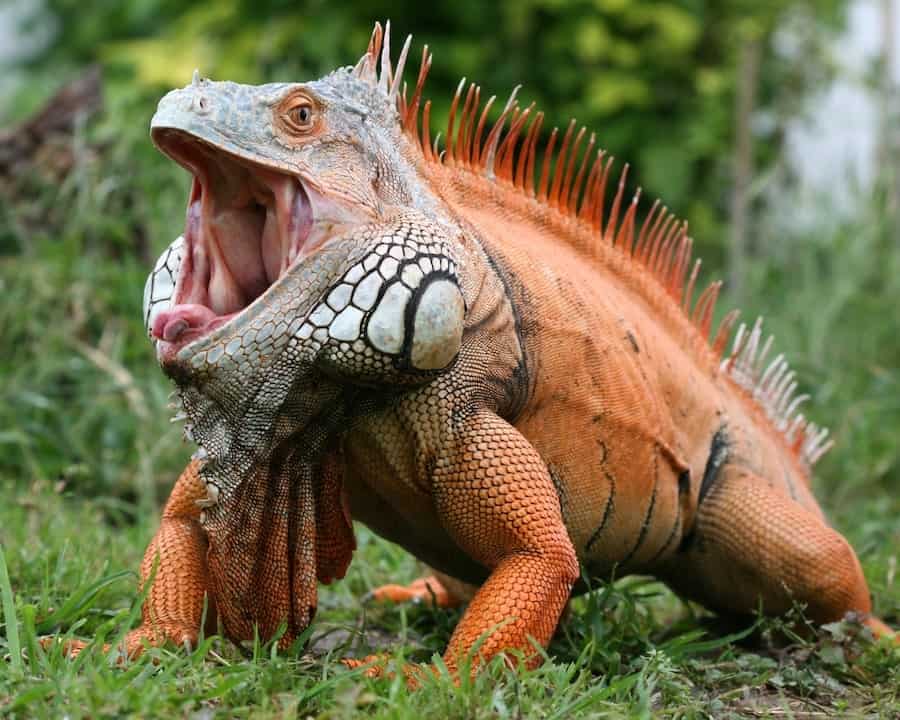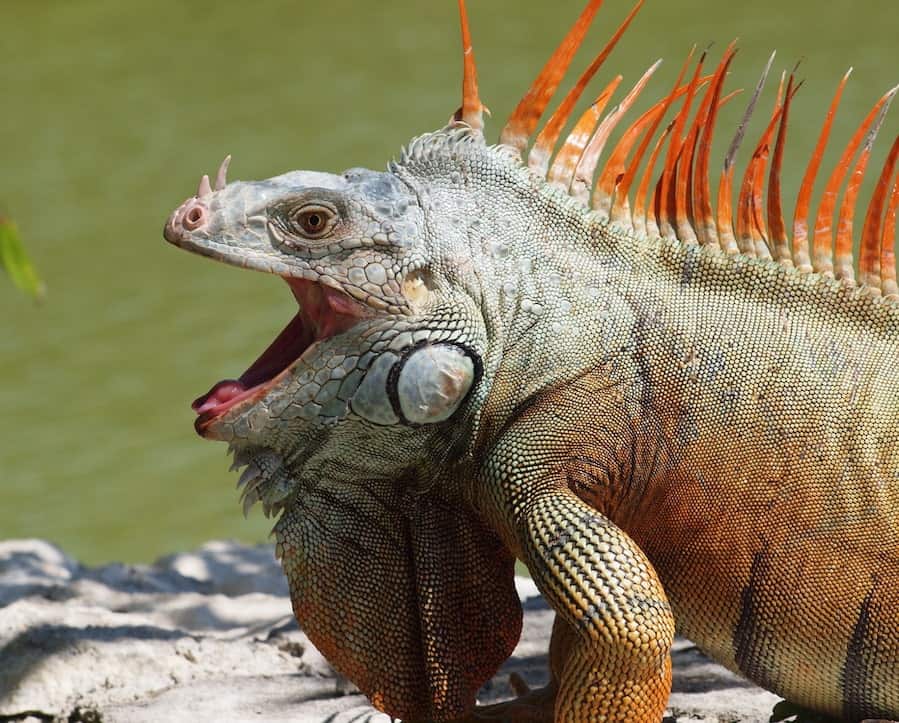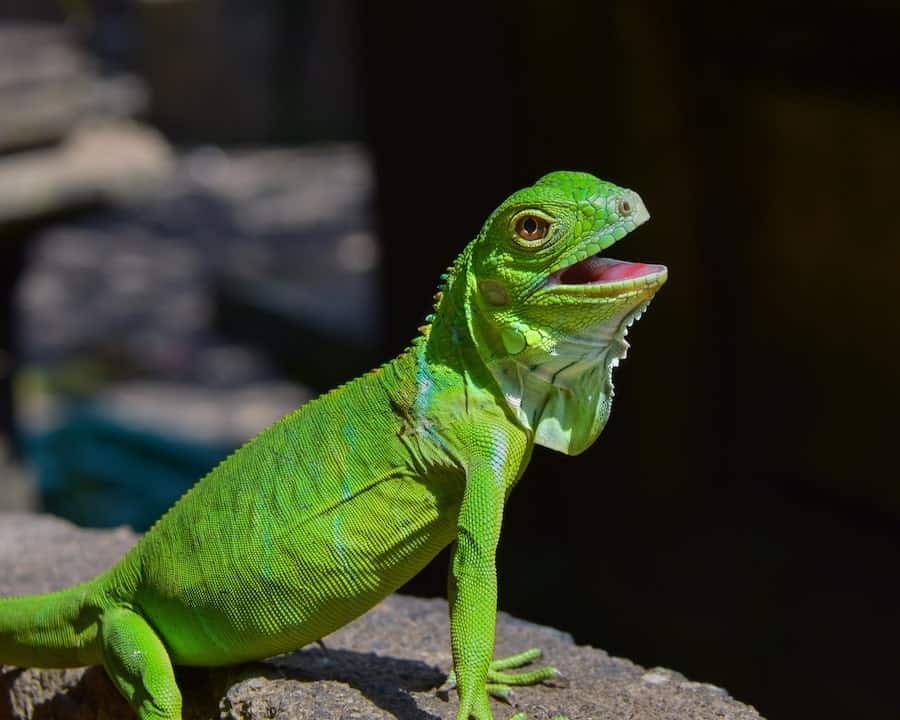If you’re a new iguana owner or are contemplating about becoming one, you may be wondering whether iguanas bite, and rightfully so.
Iguanas can definitely bite, but only as a last resort and in self-defense. Fortunately, these reptiles will provide multiple warnings before biting. Recognizing aggressive iguana behaviors is crucial in avoiding a bite.
Learning to recognize the signs of aggression and taking steps to prevent bites can help you and your iguana co-exist happily together. I’m going to share a few tips on how to recognize when an iguana is going to bite and how to stop your pet from biting you.
Do Iguanas Bite?
Iguanas can and do bite, and their bites can be painful. These lizards have serrated teeth that help them tear through plants, and they can cause some serious injury to humans.
Iguanas replace their teeth up to five times per year. A medium-sized iguana can replace up to 500 teeth in a single year, so the last thing you want is to become a victim of a bite.
Why Do Iguanas Bite?

Iguanas can bite for a number of reasons, but it’s almost always out of self-defense. In James Hatfield’s book “Green Iguana The Ultimate Owner’s Manual,” he says that biting is a final defense.
If posturing, puffing up and tail whipping aren’t enough to chase a threat away, an iguana may resort to biting.
But what can push iguanas to this limit? These reptiles may bite if:
They’re Afraid or Stressed

The most common reason iguanas bite is because they’re afraid or stressed. Most animals will have the same response if they feel pushed beyond their limits or are in fight-or-flight mode.
Iguanas can go into stress or fear mode for a number of reasons. These lizards are especially sensitive to change, which can make them fearful or stressed. They may also feel this way if they are picked up or handled without training.
How can you tell if your iguana is stressed? Check out this post I wrote called “15 Signs an Iguana is Stressed & What to do About it” to find out.
They’re Being Territorial

Iguanas may also bite if they’re being protective of their territory. For this reason, it’s best to avoid putting two male iguanas in the same enclosure. Territorial fights are bound to ensue, and if you try to intervene, you may find yourself on the receiving end of a nasty bite.
Some iguanas can also become territorial when humans enter their enclosed space. They may become aggressive and even bite if they feel threatened.
It’s Mating Season

Iguanas may also bite because it’s mating season. Mating season is often a troubling time for iguana keepers because it causes behavioral issues.
Some iguanas become more aggressive during this time of year, which runs from October through February. During this period, hormones flair, and these reptiles can become quite moody and territorial.
It’s much easier to push an iguana to its limits during the breeding season. Iguanas may become more aggressive and prone to biting because:
- You’re wearing a color they don’t like
- You have interrupted their diurnal schedule
- You haven’t provided an outlet for its mating drive
If you aren’t hyper-aware of your iguana’s behavior and posture during mating season, you may get bitten by your scaly friend.
Is an Iguana Bite Dangerous?
Iguanas have atrophied venom glands which produce a weak venom that’s harmless to humans. Still, these reptiles have sharp teeth that can do some serious damage when they bite.
Iguana bites can be dangerous because they can bite down to the bone. Their bites tend to affect sensitive parts of the body, such as the wrists, faces, ankles and fingers, which can make them even more dangerous.
It’s not uncommon for iguana owners to need stitches after a painful bite. A bite from a hatchling or juvenile may not be very painful, but the pain isn’t the only concern.
Apart from the physical injury itself, there’s also a risk of infection from bites. Iguanas can carry Salmonella, so a bite can cause severe infection in some cases.
Iguanas, in general, can be dangerous pets. I wrote a post called “Are Iguanas Dangerous? Not Your Average Pet,” which explains why these reptiles aren’t for everyone.
It’s important to note that while an iguana bite can be dangerous, they don’t typically seek out confrontation.
Being an informed and aware pet owner is one of the best ways to avoid getting bitten and raising a happy iguana.
How to Tell if an Iguana is Going to Bite You
Remember that iguanas only bite as a last resort. Before they reach their limit, they will give warnings and many clues that they’re unhappy.
Here’s how to tell if your iguana is going to bite you.
Flared Dewlap

An iguana may flare its dewlap to regulate heat, but it may also exhibit this behavior if it feels threatened.
Be cautious if your iguana’s dewlap is flared and pay attention to its body language to determine whether it’s stressed.
Hissing and Posturing

When an iguana is feeling threatened, one of the first things it will do is hiss and make its body look bigger. Their goal is to make themselves look and sound more threatening.
Hissing and posturing is your iguana’s way of telling you to back off.
Tail Whipping

When an iguana whips its tail, this is a clear sign that it’s upset and wants to be left alone. Tail whipping can cause severe injuries, so back off and give your iguana some space to cool off if it’s exhibiting this behavior.
Head Bobbing
Like a flared dewlap, head bobbing may or may not be a sign of aggression. If your pet is bobbing its head up and down quickly, this is known as a head-bobbing display and is a sign of aggression.
How to Stop Your Iguana From Biting You
There are a few things you can do to avoid getting bitten by your iguana. First and foremost, make sure that you’re doing everything you can to keep your pet out of stressful situations.
Get to know your iguana and its behavior. Be on the lookout for the signs above to identify situations that stress your pet out.
Establish a Routine
Iguana love routines. They love it when things are predictable. It helps them feel more secure and at ease.
To prevent bites caused by fear or stress, establish a routine for your iguana’s care, including:
- Feeding
- Cleaning
- Handling
Perform these activities at the same time daily to give your iguana a sense of security. Your pet will be less stressed or fearful if it knows that you’re going to handle it at 2 PM every day.
Along with setting a routine, make sure that you’re talking to your iguana, too. You want your pet to feel comfortable hearing your voice and having you around. So, observe your iguana and talk to it every day.
Train Your Iguana to be Handled
One of the best things you can do to prevent bites is to train your iguana to be handled. Training can take some time, so be patient and learn to recognize the signs of stress or a potential bite.
You don’t want to push your iguana to the limit and make it fearful of being handled.
Here are a few tips for handling:
- Always be gentle and take it slow when approaching your iguana.
- When placing your hand in the enclosure, always do so from the side – not above.
- Back off if your pet shows signs of stress or makes aggressive postures.
- Speak with a gentle tone when training and handling your iguana, even if it shows signs of panic or aggression.
- Use slow and smooth movements.
Be persistent and consistent with your training. Eventually, your iguana will get used to being handled and your hand being in the enclosure.
What to Do if You Got Bit by an Iguana

Many iguana keepers get bitten by their pets at least once. Bites can happen to even the most experienced owners.
If you get bit by an iguana, it’s important to:
Wash and Disinfect the Bite Immediately
Salmonella can be found in the feces and mouths of iguanas. If you’re bit, make sure that you wash and disinfect the bite area immediately to reduce the risk of infection.
- Use hot, soapy water.
- Wash vigorously.
If you have a first aid kit on hand, use disinfecting wipes to help keep the wound clean.
Seek Medical Attention
Always seek medical attention after an iguana bite, even if it doesn’t seem like a serious wound. It’s not uncommon for iguana bites to require stitches, but you may also need antibiotics because of the risk of Salmonella.
Make sure that you follow your doctor’s instructions on how to care for the wound to avoid complications.
Plan for Your Iguana’s Care
Depending on the severity of the wound or its location, you may need to get some help caring for your iguana until the bite has healed.
At the very least, you’ll want to avoid handling your iguana for the time being or repeating the same actions that led to the bite.
The Bottom Line
Iguanas have razor-sharp teeth, and they can deliver painful bites if they feel they need to defend themselves. But iguanas don’t lash out for no reason.
Biting is a last resort and is usually the result of feeling territorial, stressed/afraid or hormonal during mating season.

